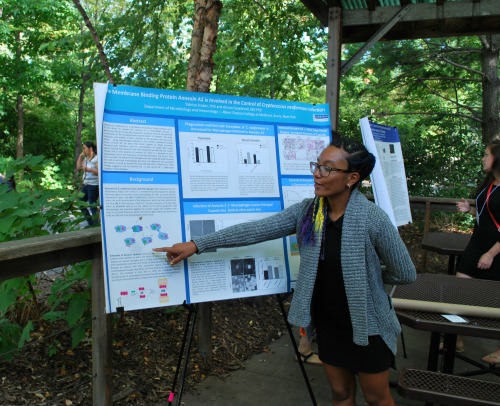
Einstein graduate student Sabriya Stukes at the Bronx Zoo explaining her research on host-pathogen interactions during the Bronx Science Consortium Student Symposium
What’s the best way to convey scientific information to nonscientists?
That’s a question young investigator Sabriya Stukes pondered this week at the second annual student research symposium sponsored by the Bronx Science Consortium. The event comes on the heels of Stukes successfully defending her Ph.D. in microbiology & immunology at Einstein.
“Whenever I think about communicating what I do in lab to a lay audience, I usually ask myself ‘What would I need to say so that my mom and dad can understand what I’m talking about?’ I try to use terminology that’s readily understood by a wide audience so that the core message of my project isn’t lost,” she says. At the symposium, Stukes presented her work on host-pathogen interactions between macrophages and the fungal pathogen C. neoformans.
The afternoon session, held on September 10 at the Bronx Zoo, featured at least 30 poster presentations by next-generation researchers from five consortium members: Einstein, Montefiore Medical Center,the Bronx Zoo/Wildlife Conservation Society, Fordham University and the New York Botanical Garden. The event included free admission to the zoo and allowed young scientists to present their work to members of the lay public, who asked questions and learned what being a scientist entails.
The consortium was established in 2012, with the objectives of expanding research collaborations and highlighting the scientific achievements of Bronx-based graduate, undergraduate and high school students. Seven Einstein graduate students volunteered for the symposium both to explain the research and to bolster support for scientific endeavors.
“We as scientists have learned (perhaps too late) that we need to be able to talk about our science, to explain its significance to the general public, not just to our research colleagues,” says Victoria Freedman, Ph.D., associate dean for graduate programs in biomedical sciences at Einstein. “We need to convince people that it’s important to keep funding research so that scientists can continue to make the discoveries that will help us later on. Science is really an investment in our future.”
Brian Currie, M.D., M.P.H., vice president and medical director for research at Montefiore, the University Hospital and academic medical center for Einstein, noted that the event is a positive way for the Bronx’s young scientific community to meet and share knowledge.
“This symposium continues to be a great venue for young investigators to present their work and network with peers who are based at the other institutions of the Bronx Science Consortium, as well as the public at large. It underscores the high level of research work being done in the Bronx at these participating institutions that might otherwise go undetected. It also showcases the commitment and investment of consortium members in mentoring and training existing and future young investigators,” Dr. Currie says.
As for Stukes, she’s eager to instill a sense of accomplishment and perseverance among high school students and other future scientists:
“As much of a cliché as it sounds, I would say ‘Never give up.’ Working in a lab can be an incredibly frustrating experience and experiments don’t always work. However, when they do, it can be one of the most rewarding experiences—knowing you’ve discovered something that no one else has.”

